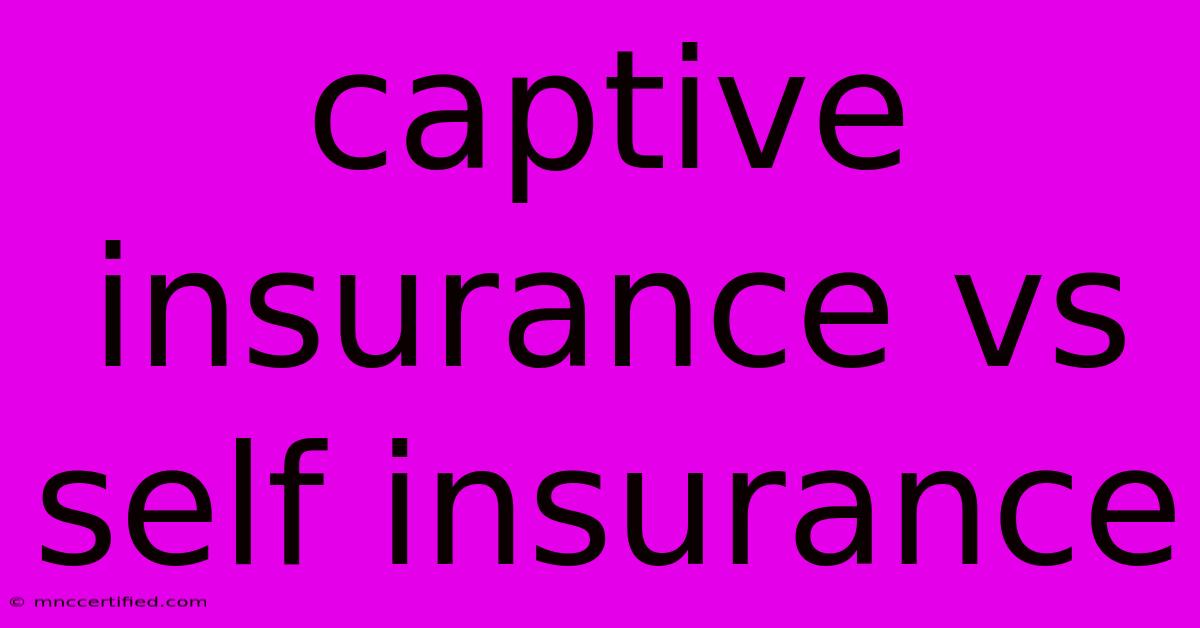Captive Insurance Vs Self Insurance

Table of Contents
Captive Insurance vs. Self Insurance: Choosing the Right Risk Management Strategy
As a business owner, you're constantly striving to protect your assets and mitigate risks. Two common strategies for achieving this are captive insurance and self insurance. While both offer potential benefits, they differ significantly in their structure, risk, and suitability. Understanding these differences is crucial for making the right choice for your organization.
What is Captive Insurance?
A captive insurance company is a subsidiary of a parent company, specifically created to insure the parent's risks. It allows businesses to take control of their insurance needs by:
- Customizing coverage: Captives can tailor policies to fit the specific risks faced by the parent company.
- Reducing premiums: By pooling risks with other captive owners, businesses can potentially achieve lower insurance premiums.
- Gaining access to reinsurance: Captives can access reinsurance markets to cover catastrophic risks.
- Building a safety net: Captive insurance can provide a financial safety net for unforeseen events.
There are two main types of captives:
- Single-parent captive: Owned by a single parent company.
- Group captive: Owned by multiple parent companies.
What is Self Insurance?
Self insurance means assuming the financial responsibility for potential losses, without purchasing traditional insurance. This approach involves:
- Setting aside funds: Businesses allocate money to cover potential claims.
- Managing claims: They handle claims in-house or through third-party administrators.
- Absorbing losses: They absorb losses directly, without relying on an insurance company.
Self insurance can be a cost-effective option when businesses:
- Have predictable risks: Losses are consistent and manageable.
- Have strong financial resources: They can absorb potential losses.
- Have access to risk management expertise: They can effectively manage risks and claims.
Comparing Captive Insurance and Self Insurance
Here's a comparison of the key differences between these two strategies:
| Feature | Captive Insurance | Self Insurance |
|---|---|---|
| Structure | Subsidiary of the parent company | Business assumes risk directly |
| Risk | Reduced through pooling and reinsurance | Assumed directly by the business |
| Cost | Initial setup costs, but potentially lower premiums in the long run | Lower initial costs, but higher potential for losses |
| Flexibility | High customization of coverage | Limited flexibility, but potentially more control over claims management |
| Suitability | Businesses with large, complex risk profiles | Businesses with predictable risks and strong financial resources |
Which Strategy is Right for You?
The best choice between captive insurance and self insurance depends on your specific needs and circumstances.
Captive insurance is a suitable option for businesses that:
- Have complex and high-risk exposures
- Seek greater control over insurance coverage and claims handling
- Desire long-term cost savings
- Have a strong financial foundation
Self insurance is a potential solution for businesses that:
- Have predictable risks
- Have significant financial resources
- Have expertise in managing risks and claims
- Seek short-term cost savings
Conclusion
Both captive insurance and self insurance offer unique advantages and disadvantages. Careful analysis of your organization's risk profile, financial capabilities, and long-term goals is essential to determine the most effective strategy. Consult with experienced insurance professionals to explore options and tailor a risk management plan that aligns with your specific needs.

Thank you for visiting our website wich cover about Captive Insurance Vs Self Insurance. We hope the information provided has been useful to you. Feel free to contact us if you have any questions or need further assistance. See you next time and dont miss to bookmark.
Featured Posts
-
The Summer I Turned Pretty Star Gavin Casalegno Gets Married
Nov 13, 2024
-
Line Of Duty Star Speaks On Shows Future
Nov 13, 2024
-
Insurance For Baseball Travel Teams
Nov 13, 2024
-
A Affordable Insurance Worcester Ma
Nov 13, 2024
-
Ex Nb Aer Singlers Post Fuels Worry
Nov 13, 2024